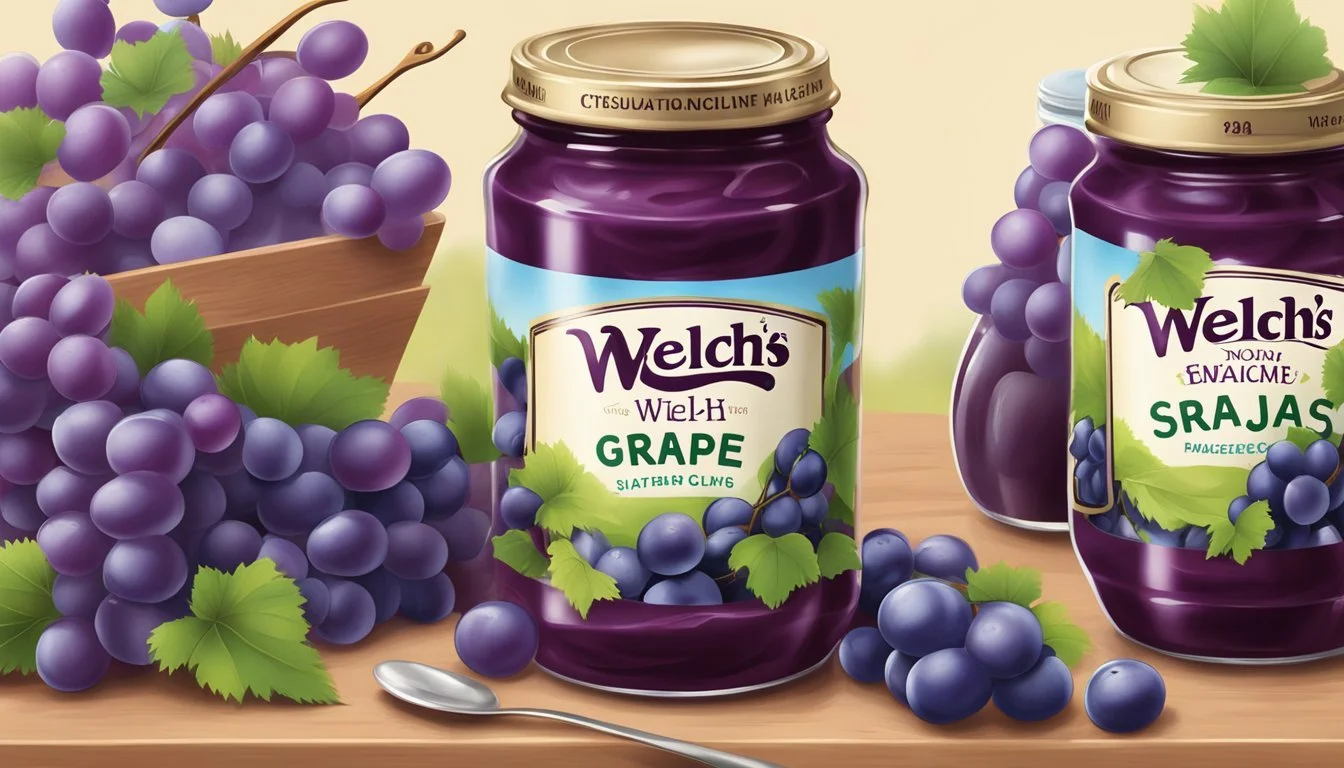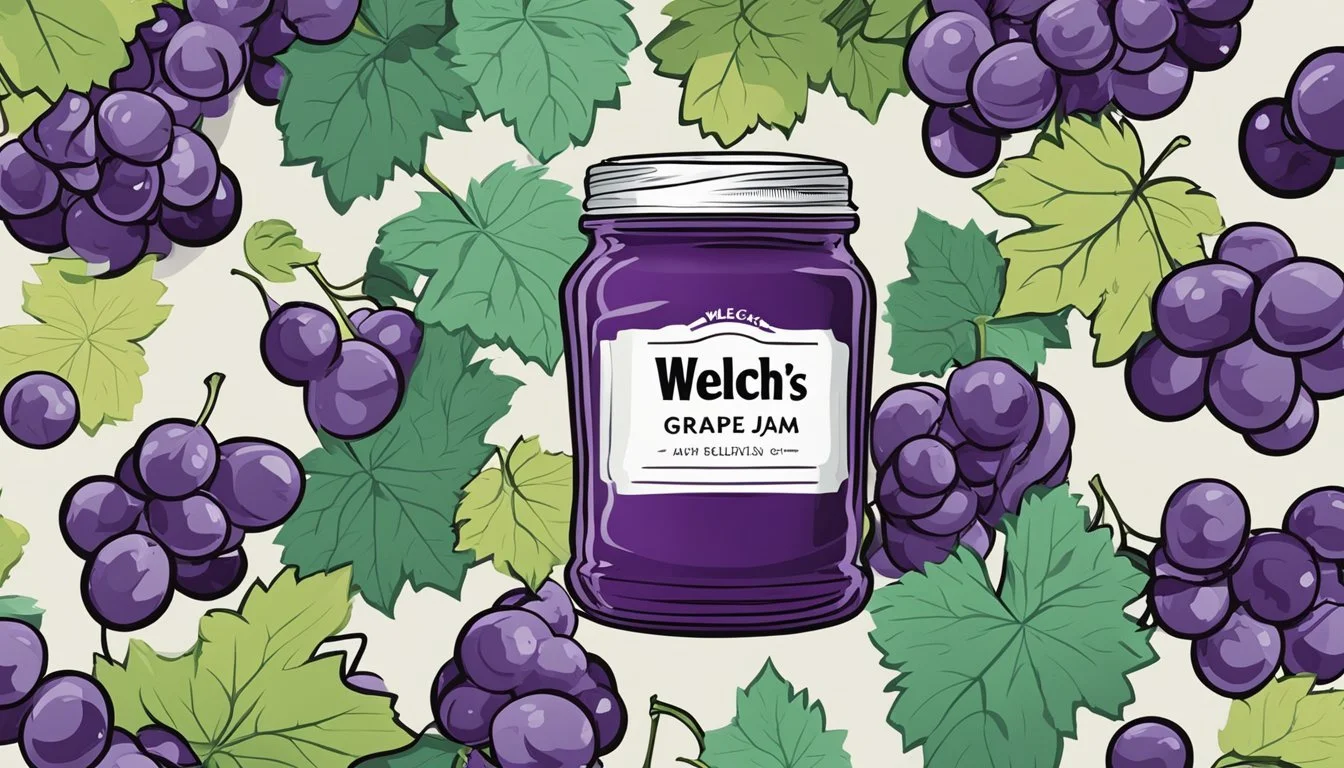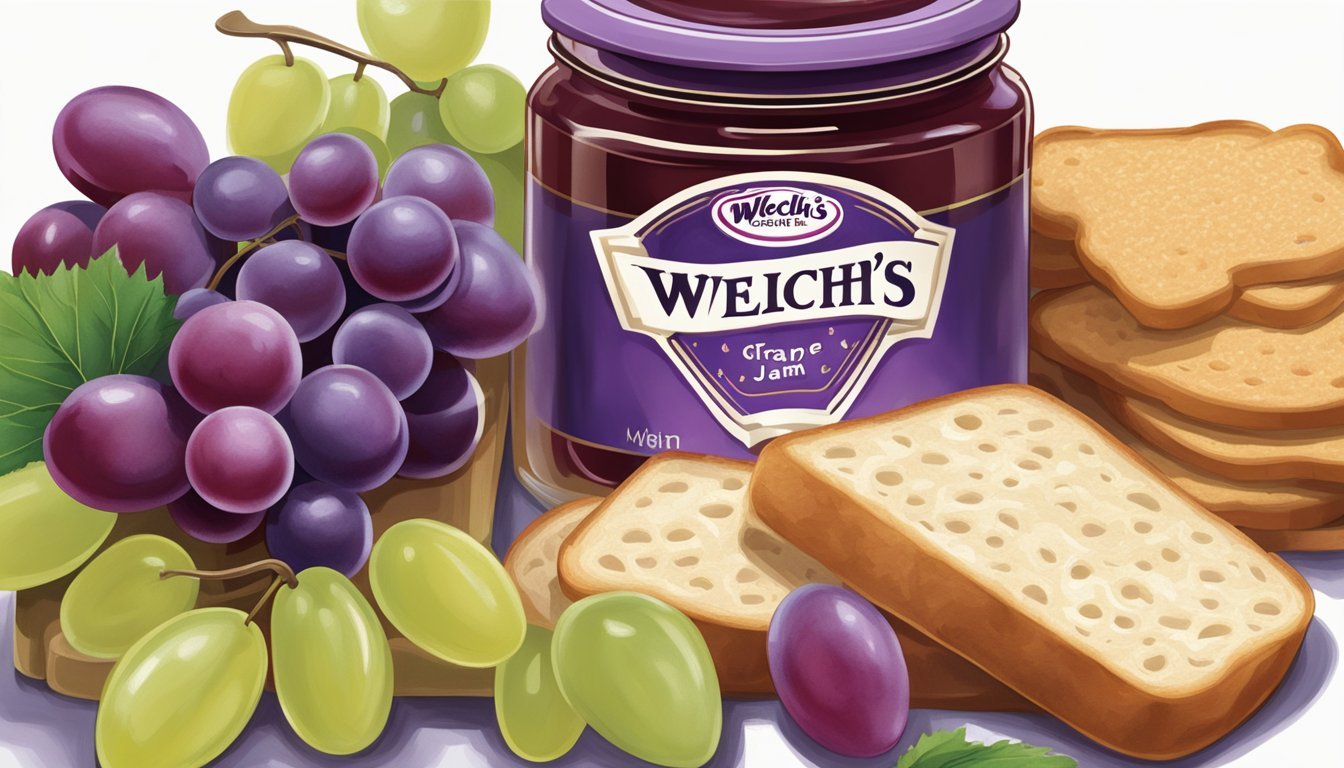How Much Welch's Grape Jam Per Day Is Too Much
Daily Limits Explained
Consuming Welch's grape jam can be a delightful addition to a variety of meals, whether it's spread on toast for breakfast or used as an ingredient in sweet and savory dishes. However, the question often arises about the appropriate serving size of such spreads. Welch’s offers a range of products including the original Concord grape jam and a reduced sugar version. While the reduced sugar grape jelly contains just 20 calories per serving, the regular version has 50 calories per tablespoon. Moderation is key, as these spreads also add sugars to one's daily intake.
The American Heart Association recommends that women limit their added sugar consumption to no more than 100 calories (about 25 grams or 6 teaspoons) per day, and men to no more than 150 calories (about 37 grams or 9 teaspoons) per day. Given this guidance, it's evident that overindulging in grape jam could contribute to an excessive sugar intake. Therefore, when enjoying Welch's grape jams and jellies, it's important for individuals to be mindful of the sugary aspect of these spreads, keeping their total daily sugar consumption within recommended limits.
Welch’s does not add artificial flavors to its grape jam, making it a popular choice among those who prefer more natural ingredients in their spreads. When considering how much Welch's grape jam or jelly to consume daily, one should bear in mind both the calorie content and the sugar content in comparison to their overall dietary needs and restrictions. Regular monitoring and adjustment ensure that it can be enjoyed as part of a balanced diet.
Nutritional Content of Welch's Grape Jam
Welch’s Grape Jam is known for its concentration of sugars and flavor from Concord grapes. Each tablespoon serving reflects a distinct nutritional profile, notable for its calorie count and sugar content.
Caloric Value and Macronutrients
Calories: A single tablespoon (about 20 grams) of Welch's Concord Grape Jam contains approximately 50 calories.
Total Fat: 0g
Sodium: Information on sodium content varies; some sources suggest approximately 0-15mg per serving.
Total Carbohydrates: Around 13g, which includes sugars and possibly a small amount of fiber.
Sugars: Sugars are prominent in this jam, often being as high as 12g per serving.
Protein: Typically, there is less than 1g of protein in a tablespoon of Welch’s Grape Jam.
Vitamins and Minerals Profile
Vitamins and Minerals: Grape jam generally contains some vitamin C and small amounts of minerals such as potassium but is not a significant source of vitamins and minerals.
Calcium and Iron: These minerals are not present in notable amounts.
Added Sugars and Sweeteners
High Fructose Corn Syrup: Some versions of this jam do not contain high fructose corn syrup, focusing on the natural sugars from grapes.
Corn Syrup: Not typically listed in the ingredients for Welch's products that emphasize no artificial flavors.
Added Sugars: Welch’s Grape Jam does have added sugars; specific amounts can vary but are included in the total sugar content.
Pectin: Used as a thickening agent, fruit pectin is a common ingredient in jams to achieve the desired consistency without artificial additives.
Health Considerations
When considering how much Welch's grape jam to consume daily, one must take into account sugar intake recommendations, potential impacts on heart health, and implications for weight management. These factors play a significant role in determining the appropriate serving size.
Daily Sugar Intake Recommendations
The intake of added sugars should be limited as part of a nutritious diet. The Dietary Guidelines for Americans suggest that added sugars make up less than 10% of one's daily calorie intake. For an average 2,000-calorie diet, this equates to a maximum of 200 calories, or about 50 grams of sugar per day. Considering Welch's grape jam contains approximately 50 calories and 13 grams of sugar per tablespoon, moderation is key to staying within these guidelines.
Impact on Heart Health
The relationship between sugar consumption and heart health is a topic of ongoing research. High intakes of added sugars can contribute to increased risk of heart disease. Welch's grape jam, and similar products, are low in saturated fat and trans fat, both of which are important considerations for maintaining heart health. Polyphenols, which are present in grapes, are associated with heart health, but the processing of whole grapes into jam may reduce these benefits significantly.
Weight Management and Obesity
Excessive consumption of calorically dense foods with high sugar content may contribute to weight gain and obesity. Welch's grape jam contains calories predominantly from sugars, with little to no dietary fiber, which is important for satiety and weight management. Individuals aiming for a healthy weight are recommended to be mindful of their jam intake to avoid unnecessary calories that may lead to weight gain.
Consumption Recommendations
When considering the intake of Welch's grape jam, individuals need to adhere to general nutritional guidelines regarding added sugars and account for any specific dietary requirements or allergies.
Guidelines for Adults and Children
The FDA sets a Daily Value (DV) for added sugars at no more than 10% of total daily calories. For an average adult diet of 2,000 calories, this equates to about 50 grams of added sugars. However, organizations like the American Heart Association recommend stricter limits:
For women: No more than 25 grams (6 teaspoons) per day
For men: No more than 37 grams (9 teaspoons) per day
For children, recommended amounts vary with age and caloric needs, but typically it is advised that they consume even less added sugar than adults. When considering Welch's grape jam, one should account for a serving size, which typically equates to one tablespoon, containing around 13 grams of sugar on average.
Reduced sugar or low sugar options can be chosen to help stay within these recommendations. Welch's may offer such alternatives that have less added sugar per serving.
Special Diets and Allergies
For individuals with specific nutritional needs or allergies, Welch's grape jam offers gluten-free options. This is particularly relevant for those with celiac disease or gluten sensitivity. It is crucial for consumers to verify labels for certifications to avoid cross-contamination or the presence of allergens.
It is also useful to note that some people may be looking for reduced sugar jelly versions as part of special diets aimed to limit sugar intake due to health conditions such as diabetes. When selecting a Welch's grape jelly product, one should look for these specific labels to ensure they fit their dietary requirements.
To conclude, while enjoying Welch's grape jam can be part of a balanced diet, it is necessary for consumers to monitor their overall intake of added sugars and choose products that align with their specific dietary needs and health goals.
Grape Varieties in Jams
When discussing grape jams, the type of grape is a pivotal factor in both the taste and nutritional value of the product. In particular, Welch's uses the Concord grape, a variety known for its distinct flavor and health benefits.
Benefits of Concord Grapes
Concord grapes, the primary fruit in Welch's grape jam, are notable for their high content of polyphenols. These compounds are antioxidants and are linked to various health benefits, including supporting heart health and maintaining a robust immune system. Concord grapes also provide vitamins and minerals essential to daily nutrition.
Polyphenols: Antioxidant properties that can help protect against chronic diseases.
Vitamins: Vitamins C and K are present in Concord grapes.
Minerals: Such as potassium, which is vital for heart health and muscle function.
Comparison with Other Grape Types
While Concord grapes are favored for their robust flavor and health benefits in jams, other grape types like white grapes are commonly used in products such as white grape juice. Compared to Concord grapes, white grape varieties often have a milder flavor and potentially differ in nutrient composition. It is important to consider that not all grape types provide the same levels of polyphenols or antioxidants as the Concord variety does in Welch's products.
Flavor:
Concord Grapes: Bold, slightly tangy flavor profile.
White Grapes: Milder, often sweeter taste.
Nutrient Comparison:
Concord Grapes: Higher in antioxidants and polyphenols.
White Grapes: May offer different nutrient profiles, with varying antioxidant levels.
Jam Uses and Pairings
Welch's grape jam is a versatile spread that can enhance the flavors of various dishes. It pairs well with classic ingredients and can be incorporated into an array of recipes.
Popular Recipes and Combinations
One of the quintessential uses for grape jam is in a PB&J (peanut butter and jelly) sandwich, a staple in American lunchboxes. Complementing the nutty flavor of peanut butter with the sweet and fruity tones of grape jam creates a balanced and satisfying sandwich. Toast serves as an excellent base for grape jam, whether combined with butter for simplicity or topped with cream cheese for a rich breakfast option.
Here's a brief list of popular pairings:
Peanut Butter & Grape Jam: PB&J Sandwich
Toast: Butter & Jam or Cream Cheese & Jam
Additionally, grape jam can be a key ingredient in fruit spreads for pastries or as a glaze for meats, offering a sweet contrast to savory flavors.
Creative Serving Suggestions
For those looking to explore beyond traditional uses, grape jam can be the secret ingredient that brings a unique twist to recipes. Pinterest offers a wealth of grape jam-inspired recipes, from thumbprint cookies to barbecue sauces enriched with a hint of grape sweetness. Adding grape jam to 100% juice-based dressings or marinades is a creative way to incorporate it into different aspects of a meal.
A quick look at some inventive ideas includes:
Desserts: Infusing jam into cakes, pastries, and cookies
Glazes: Complementing meats with a jam-based glaze
Marinades: Mixing jam with juice and spices for a flavorful marinade
Using spreads like Welch's grape jam in recipes not only provides a burst of grape flavor but also contributes to the moisture and texture of the dish.
Labels and Production
When selecting Welch's grape jam, consumers should pay attention to nutrition labels for dietary management and understand the product's manufacturing processes for quality assurance.
Understanding Nutrition Labels
Welch's grape jam labels provide essential information, including serving size and daily values. A typical serving size is 1 tablespoon (20g), offering about 50 calories. Labels elucidate the contents, such as fruit pectin, citric acid, and sodium citrate. They also clarify if the product contains juice from concentrate. Regarding sugars, consumers should note the FDA's recommended daily intake is 200 calories (50 grams, or 12 teaspoons) of added sugars, while health organizations suggest lower amounts.
Manufacturing Processes
The production of Welch's grape jam begins with USA-grown grapes. The grapes are crushed to extract the juice, which may sometimes be from concentrate, especially in juice cocktails. The process involves adding fruit pectin to thicken the jam and citric acid to maintain tartness and preserve the product. Sodium citrate is used to achieve the desired acidity. Manufacturing complies with copyright law, ensuring that the Welch's brand retains its intellectual property while providing transparency about the product's content and origin.
Brand and Corporate Information
Welch's is not only a household name for grape jam but also a company with a rich heritage and business practices that contribute back to its farmer owners.
History of Welch's
In 1869, Dr. Thomas Bramwell Welch used the Concord grape to launch a grape juice business that would evolve into the Welch's brand known today. Welch's grape juice business originally began as a non-alcoholic wine for the church, which developed into a range of grape-based products including the famous Concord grape jelly. Welch's has thus become synonymous with grape jelly in American households.
Welch's Business Practices
Welch Foods Inc., operating as Welch's, is headquartered in Concord, Massachusetts and has been owned by the National Grape Cooperative Association since 1956. This cooperative is a group of grape growers who collectively share in the company's profits and decision-making. Welch's is committed to sustainable farming practices, ensuring that the USA-grown grapes they use are processed quickly and meticulously, often within 8 hours of picking. Their business practices not only help support the livelihoods of their family farmer owners but also aim to deliver products made from the finest processes. Such methods make use of 90% of the grapes harvested, pressing the skin and seeds to maximize the health benefits and flavors in their recipes. Profits from the sales of Welch's products are used to support these family farmers, ensuring the company's sustainability and consistent product quality.









